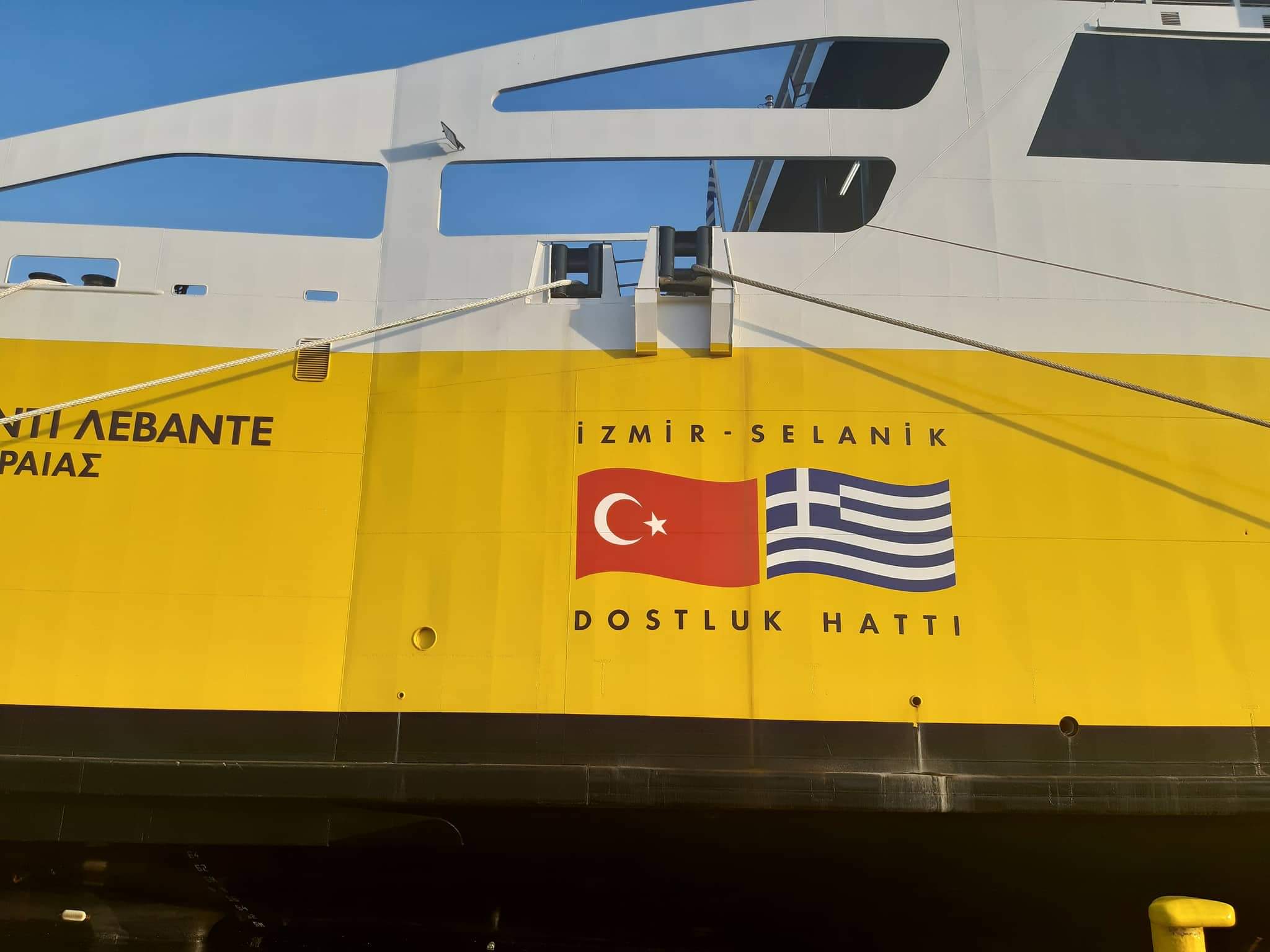From Thessaloniki to Izmir, the friendship ferry
Against the backdrop of growing tensions between Greece and Turkey, a positive counter-signal comes from the sea: the first regular ferry was recently launched between the cities of Thessaloniki and Izmir

From-Thessaloniki-to-Izmir-the-friendship-ferry
Ferry from Thessaloniki, Greece to Izmir, Turkey © Georgia Dimaki
On Monday, October 10 at 5 pm, the passenger ferry Smyrna di Levante of Levante Ferries set sail from Thessaloniki, Greece to Izmir (or Smyrna, as nostalgically referred to by Greeks), Turkey, in what has been the first service in recent memory between the two seaside cities.
This project has finally become reality after over two decades of fruitless discussions between different stakeholders from both sides, but also amid rising tensions between Greece and Turkey.
This connection is of particular importance as it unites not only Greece with Turkey, but also Europe with Asia. Moreover, by serving passengers and cargo from Europe and the Balkans, it fills in a void that had been existing for decades.
Levante Ferries invested 16 million Euros in what is, according to CEO Efstratios Apergis, “a purely private initiative”. The Greek-flagged ferry is 158.42 metres long and has the capacity to transport 948 passengers, 300 cars, and 55 trucks. Fares start at 81 Euros for a seat in the lounge or on deck, with a 10% discount for return tickets. The trip lasts about 14 hours, with services from Thessaloniki to Izmir and vice versa three times per week.
A highly symbolical connection
Bilateral relations between Greece and Turkey have been particularly tense ever since the 2020 Greek-Turkish border crisis along the Evros river. On 28 February 2020, the Turkish government announced that, following the death of 34 Turkish soldiers in Syria’s Idlib, Turkey would open its borders with the EU and not prevent refugees and migrants from crossing to Europe.
In response, Greece closed the Pazarkule-Kastanies and Ipsala-Kipi border gates to prevent border crossings and strengthened its border forces, while also seeking EU support. This incident was the beginning of a series of reciprocal allegations on human rights violations of migrants and asylum-seekers and other accusations that have poisoned bilateral relations to date.
In the past three years, Greece and Turkey have clashed on a number of critical issues of regional security and defence. Long-running territorial disputes have recently flared up as a side-effect of the two countries’ different responses to the implications of the conflict in Ukraine and, consequently, their diverging stances on Russia. The Aegean islands spat keeps flaring up, while the Mediterranean row has spread from the divided island of Cyprus to Libya with the very recent regional dispute over Libyan oil.
People from both sides have been living under the constant fear of an ‘incident’ that might lead into a war between the two countries. Lately, Greek political analysts and government officials have cited President Erdogan’s characteristic phrase “Greece, we might come unexpected at night” as an open threat. This phrase, which has been used by President Erdogan on different occasions at least since 2017, was used again last September at a public speech he made in the Turkish city of Samsun.
This time, however, the Greek people had extra reasons to respond emotionally, as this occasion coincided with the commemoration of 100 years since the tragic events in Smyrna: It was September 12, 1922, when Hellenism was erased once and for all from Asia Minor as a result of a bloodshed operation that Greeks refer to as “the destruction of Smyrna” and Turks as the climax of their “War of Independence” or “Salvation war”.
In Greece, the commemoration of the Turkish capture of Smyrna has been accompanied by several cultural and educational activities throughout the whole year. Many of these activities, mainly of nostalgic nature, have aimed at reviving the glory of Smyrna as a cosmopolitan, vibrant city, where the Greeks of Asia Minor would enjoy a prosperous life.
The friendship ferry
In this context, the establishment of a ferry line under the name “friendship” (filia in Greek, dostluk in Turkish) carries an obviously positive connotation. The last time that a similar connection existed was back in 2006, when the Friendship Express Train made its first trip from Thessaloniki to Istanbul. Unfortunately, this endeavour would not last long. Thessaloniki, however, has remained connected to Istanbul by daily buses and planes.
In the following years, there were several discussions to establish a link between Thessaloniki and Izmir, two cities which remained disconnected from each other despite their historic cultural bonds. Former Mayor of Thessaloniki Yiannis Boutaris was one of the people who made systematic efforts to launch the ferry connection, yet constant political tensions between the two countries would sabotage all plans.
The private ferry company that has now managed to bring this vision to life sees this ambitious project as a bet. Tour operators from both sides seem to embrace the initiative. The local Greek and Turkish media have also been highly encouraging. With tourism and commerce having been hit the hardest in both countries, the new ferry line is a golden opportunity from business-people across the two sides of the Aegean.
With the two countries entering a pre-electoral period, it is expected to hear even more populist, ethnocentric narratives glorifying the country’s determination, especially against the ‘usual enemies’. Amid this polarised environment, the establishment of the connection between Izmir and Thessaloniki is a positive counter-narrative, not to mention a promising business deal that can give new impetus to tourism and commerce.
From Thessaloniki to Izmir, the friendship ferry
Against the backdrop of growing tensions between Greece and Turkey, a positive counter-signal comes from the sea: the first regular ferry was recently launched between the cities of Thessaloniki and Izmir

From-Thessaloniki-to-Izmir-the-friendship-ferry
Ferry from Thessaloniki, Greece to Izmir, Turkey © Georgia Dimaki
On Monday, October 10 at 5 pm, the passenger ferry Smyrna di Levante of Levante Ferries set sail from Thessaloniki, Greece to Izmir (or Smyrna, as nostalgically referred to by Greeks), Turkey, in what has been the first service in recent memory between the two seaside cities.
This project has finally become reality after over two decades of fruitless discussions between different stakeholders from both sides, but also amid rising tensions between Greece and Turkey.
This connection is of particular importance as it unites not only Greece with Turkey, but also Europe with Asia. Moreover, by serving passengers and cargo from Europe and the Balkans, it fills in a void that had been existing for decades.
Levante Ferries invested 16 million Euros in what is, according to CEO Efstratios Apergis, “a purely private initiative”. The Greek-flagged ferry is 158.42 metres long and has the capacity to transport 948 passengers, 300 cars, and 55 trucks. Fares start at 81 Euros for a seat in the lounge or on deck, with a 10% discount for return tickets. The trip lasts about 14 hours, with services from Thessaloniki to Izmir and vice versa three times per week.
A highly symbolical connection
Bilateral relations between Greece and Turkey have been particularly tense ever since the 2020 Greek-Turkish border crisis along the Evros river. On 28 February 2020, the Turkish government announced that, following the death of 34 Turkish soldiers in Syria’s Idlib, Turkey would open its borders with the EU and not prevent refugees and migrants from crossing to Europe.
In response, Greece closed the Pazarkule-Kastanies and Ipsala-Kipi border gates to prevent border crossings and strengthened its border forces, while also seeking EU support. This incident was the beginning of a series of reciprocal allegations on human rights violations of migrants and asylum-seekers and other accusations that have poisoned bilateral relations to date.
In the past three years, Greece and Turkey have clashed on a number of critical issues of regional security and defence. Long-running territorial disputes have recently flared up as a side-effect of the two countries’ different responses to the implications of the conflict in Ukraine and, consequently, their diverging stances on Russia. The Aegean islands spat keeps flaring up, while the Mediterranean row has spread from the divided island of Cyprus to Libya with the very recent regional dispute over Libyan oil.
People from both sides have been living under the constant fear of an ‘incident’ that might lead into a war between the two countries. Lately, Greek political analysts and government officials have cited President Erdogan’s characteristic phrase “Greece, we might come unexpected at night” as an open threat. This phrase, which has been used by President Erdogan on different occasions at least since 2017, was used again last September at a public speech he made in the Turkish city of Samsun.
This time, however, the Greek people had extra reasons to respond emotionally, as this occasion coincided with the commemoration of 100 years since the tragic events in Smyrna: It was September 12, 1922, when Hellenism was erased once and for all from Asia Minor as a result of a bloodshed operation that Greeks refer to as “the destruction of Smyrna” and Turks as the climax of their “War of Independence” or “Salvation war”.
In Greece, the commemoration of the Turkish capture of Smyrna has been accompanied by several cultural and educational activities throughout the whole year. Many of these activities, mainly of nostalgic nature, have aimed at reviving the glory of Smyrna as a cosmopolitan, vibrant city, where the Greeks of Asia Minor would enjoy a prosperous life.
The friendship ferry
In this context, the establishment of a ferry line under the name “friendship” (filia in Greek, dostluk in Turkish) carries an obviously positive connotation. The last time that a similar connection existed was back in 2006, when the Friendship Express Train made its first trip from Thessaloniki to Istanbul. Unfortunately, this endeavour would not last long. Thessaloniki, however, has remained connected to Istanbul by daily buses and planes.
In the following years, there were several discussions to establish a link between Thessaloniki and Izmir, two cities which remained disconnected from each other despite their historic cultural bonds. Former Mayor of Thessaloniki Yiannis Boutaris was one of the people who made systematic efforts to launch the ferry connection, yet constant political tensions between the two countries would sabotage all plans.
The private ferry company that has now managed to bring this vision to life sees this ambitious project as a bet. Tour operators from both sides seem to embrace the initiative. The local Greek and Turkish media have also been highly encouraging. With tourism and commerce having been hit the hardest in both countries, the new ferry line is a golden opportunity from business-people across the two sides of the Aegean.
With the two countries entering a pre-electoral period, it is expected to hear even more populist, ethnocentric narratives glorifying the country’s determination, especially against the ‘usual enemies’. Amid this polarised environment, the establishment of the connection between Izmir and Thessaloniki is a positive counter-narrative, not to mention a promising business deal that can give new impetus to tourism and commerce.









